ROVING REPORTERS
On patrol with the Black Mambas, the all-female anti-poaching unit in the Greater Kruger area
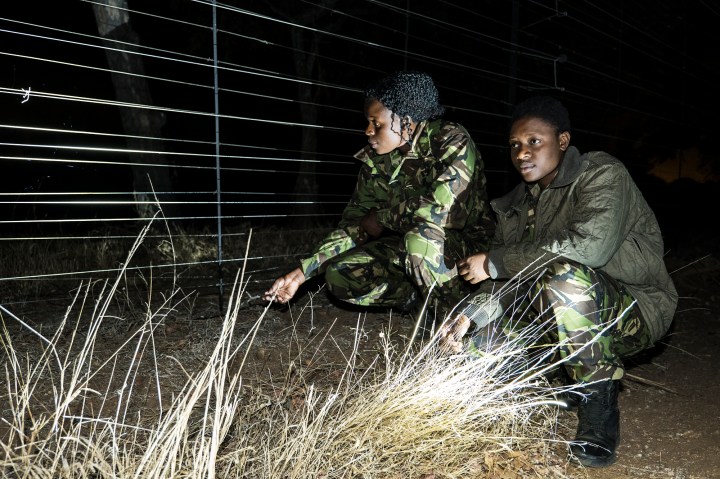
Dealing with poachers and knowing some might be neighbours is not for the faint-hearted.
Deep in dense bush, Nkateko Mzimba raises a hand. Her patrol team, members of the all-female Black Mamba Anti-Poaching Unit, come to a halt. The unit has found tracks, clear imprints of shoes in the sand.
They are unarmed and deep in poaching territory — a game reserve bordering the Kruger National Park.
Before signing up with the Mambas seven years ago, Mzimba never imagined carrying handcuffs, ready to clasp on the wrists of a suspected poacher.
She had been unable to study further after leaving high school and jobs were scarce in her village on the park’s rural western boundary.
Mzimba’s mother, a single parent, did her best to make ends meet, but there was no money to spare for university or college.
“I was sitting at home doing nothing,” says Mzimba.
Days turned into weeks, weeks into months.
Fast-forward to early spring 2021. South Africa was still recovering from the orgy of looting sparked by the incarceration of former president Jacob Zuma. Like many, Mzimba was rattled by the violence but had other things on her mind. She was now a Black Mamba sergeant on patrol with three other rangers under her command.
Not far from where Mzimba raised her hand, a man watches them, hiding in the bush.
Gift
Nkateko is a Xitsonga name meaning “gift” or “blessing”. Mzimba means “body”.
The 31-year-old is among 23 women deployed as Black Mambas in the Grietjie Private Nature Reserve and the Ekuthuleni Conservancy on the western boundary of the Kruger National Park near Hoedspruit.
Employment is hard to find in these parts and bushmeat poaching is rampant.
“The problem is not new,” says Craig Spencer, the founder and director of Transfrontier Africa — a not-for-profit company that focuses on ecological research and protected area management. The Black Mamba Anti-Poaching Unit is one of its key projects.
Spike
Spencer reckons Covid-19 led to a spike in illegal hunting for bushmeat in the Greater Kruger area. And because wildlife laws were poorly enforced, conviction rates remained low. Left to government agencies alone to address, poaching would continue unchecked, ultimately leading to the decimation of the region’s wildlife.
Spencer says the historical exclusion of people living near protected areas has exacerbated the problem.
“They do not view themselves as custodians of our natural heritage or beneficiaries of the wildlife economy,” says Spencer. “So, at Transfrontier Africa NPC, we use a multipronged approach in developing socioeconomic, technological and tactical solutions.”
The Black Mambas are among the tactical interventions. The women patrol some of the fence lines of private nature reserves bordering the Kruger Park, on foot in the morning, and by vehicle at night. They sweep for snares, watch from observation posts and stage roadblocks.
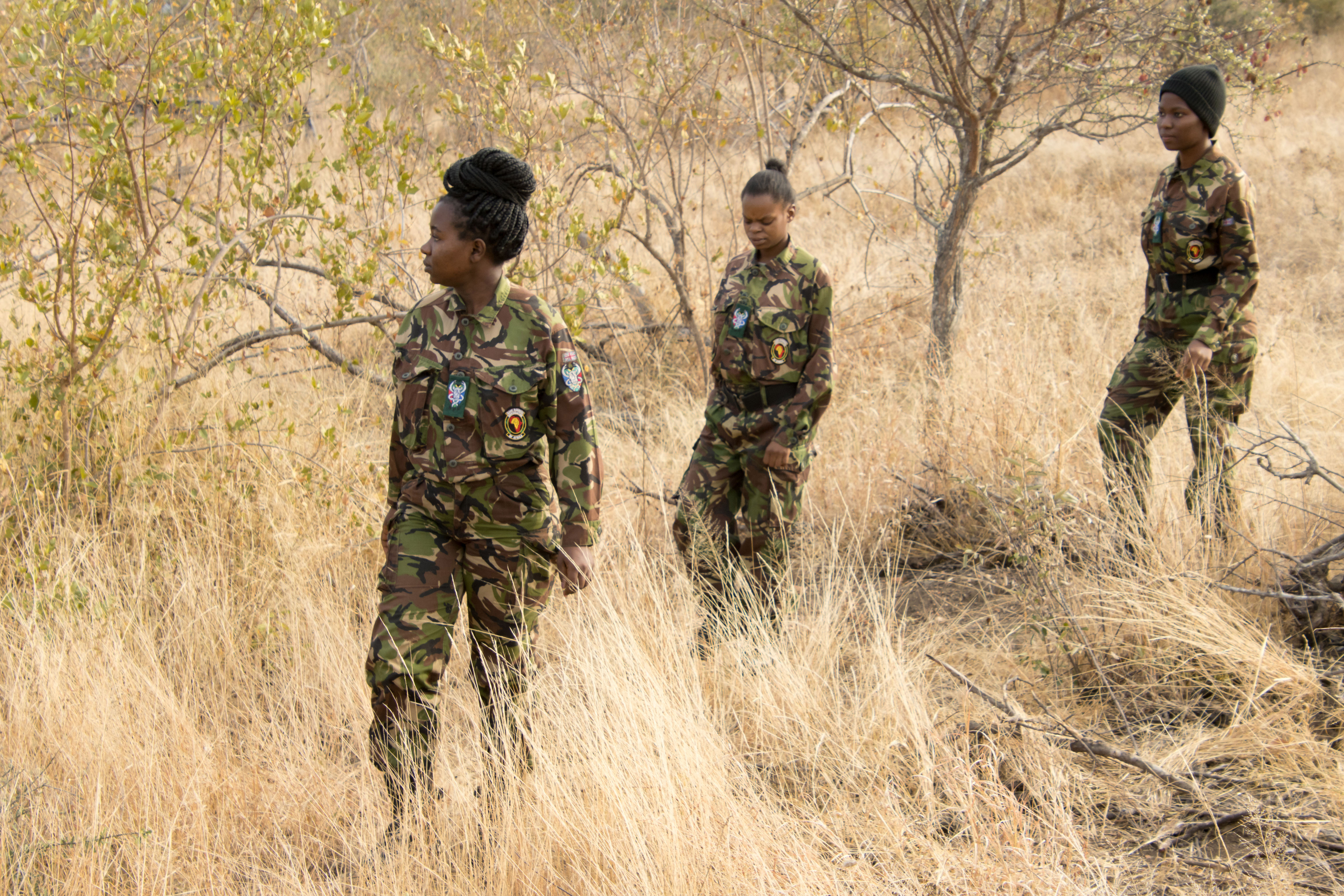
Black Mambas search for snares in the Olifants West Nature Reserve. (Photo: Frank Odenthal)
“We are part of the first line of defence,” says Mzimba. “Keeping poachers out of the reserve instead of dealing with them inside the protected area makes more sense long-term.”
Proactive
The importance of this proactive surveillance in relation to the bigger problem of rhino poaching is stressed on the unit’s website. It reads: “If a person can sneak into a reserve to set snares or to collect their catch, they have the potential to evolve into a rhino poacher. They gain ‘local knowledge’ of the area, making them valuable contacts for organised rhino poachers.”
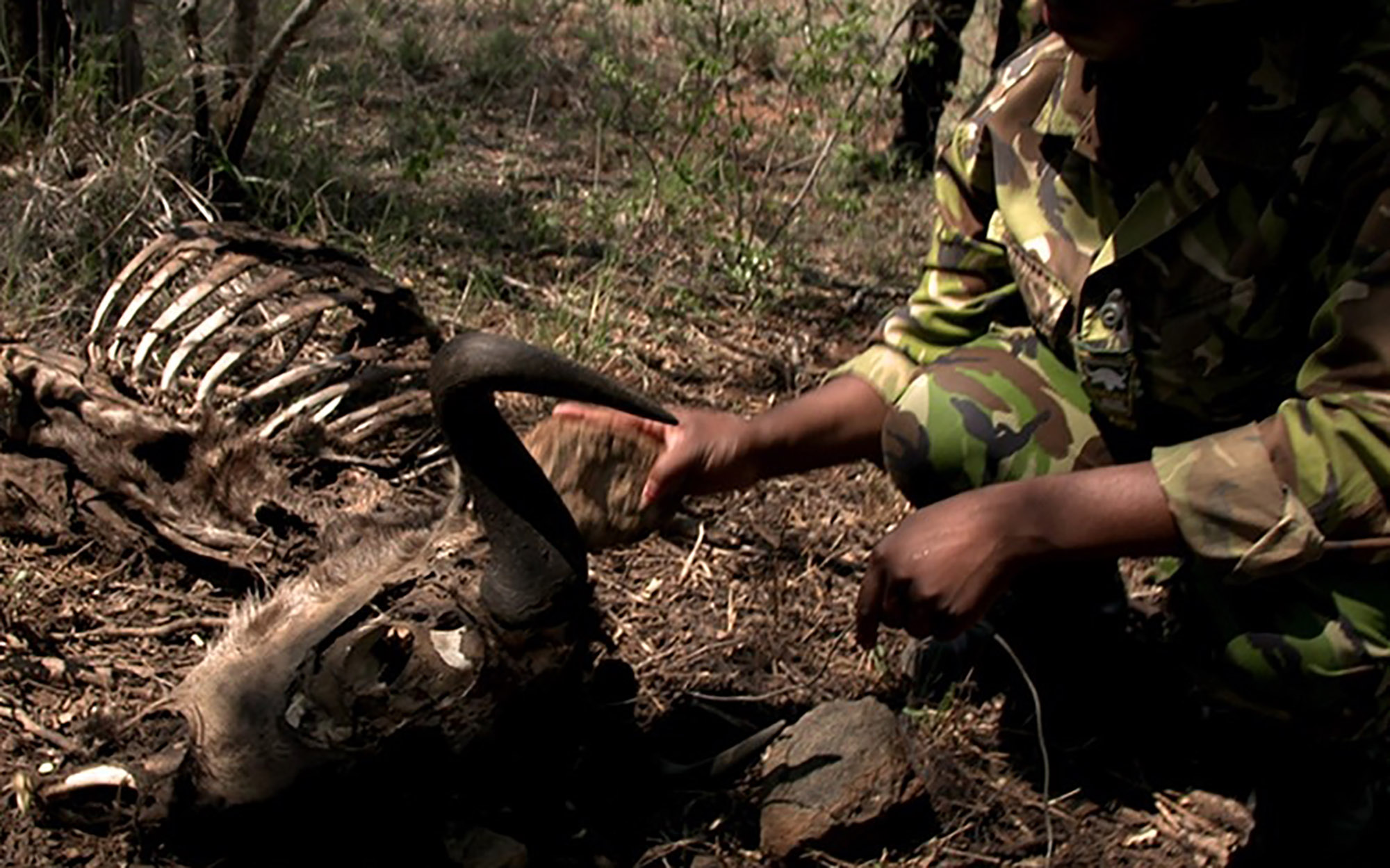
Dead wildebeest — countering the snaring scourge is not easy. Unlike active hunting, which is easier to police, setting snares is inexpensive and silent, making it harder to catch those doing it. Once trapped in a noose attached to a tree, shrub or stump in dense vegetation, it’s difficult for animals to escape. (Photo: Kate Thompson-Gorry)
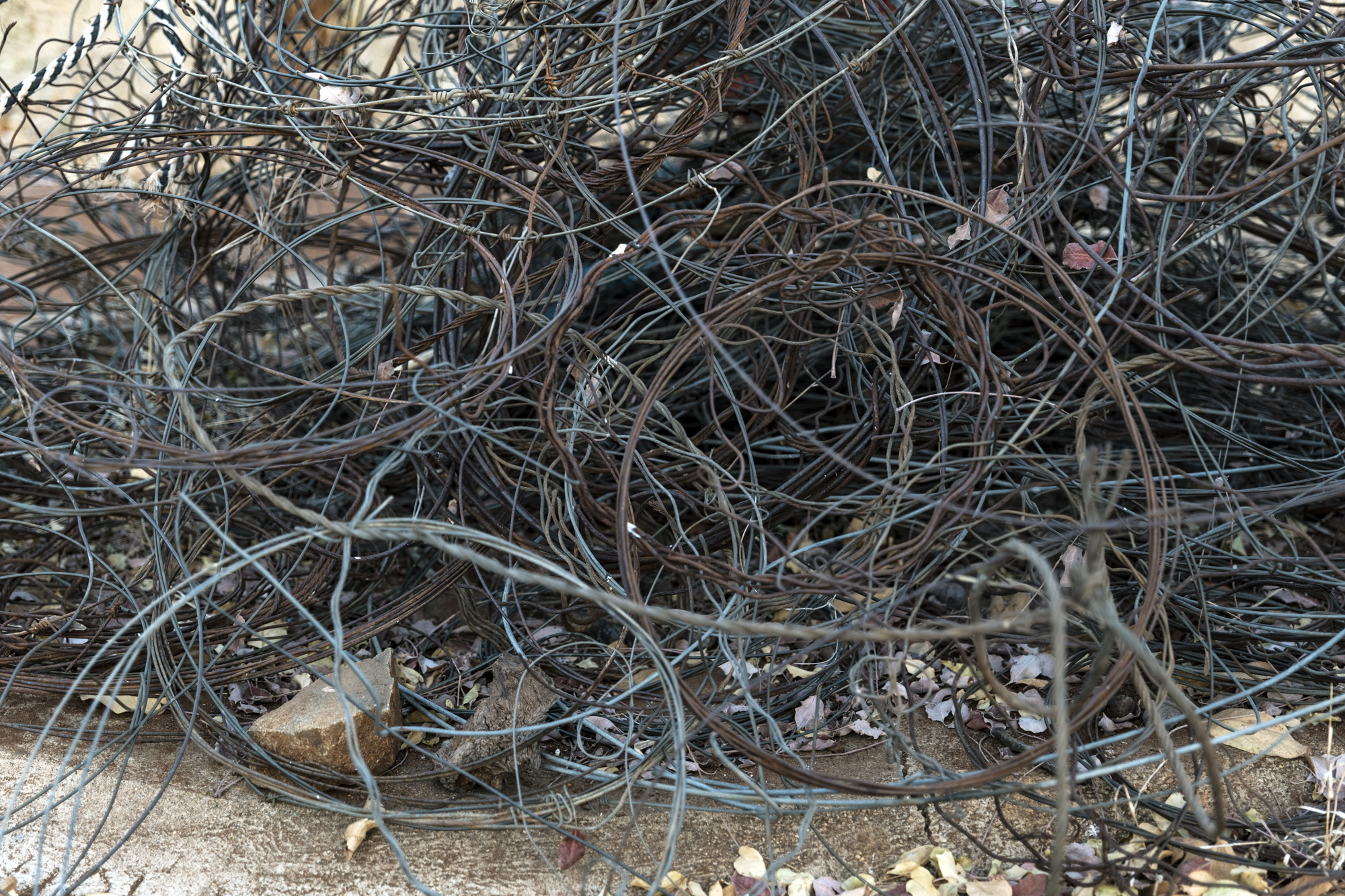
Several hundred confiscated snares, found or removed from wildlife within the reserve. (Photo: Ilan Godfrey / Getty Images for Lumix)
Snare sweep
“The snare sweep on September 2, 2021, started off quietly,” Mzimba recalls.
They were patrolling the Grietjie Private Nature Reserve 18km south of Phalaborwa and the adjoining Kruger. On other days they might come across as many as 11 snares on a morning patrol. But this day was different. No matter how thoroughly the team searched, no snares were found. Branches slapped the rangers’ faces. Thorns scratched their arms and hands.
Then Nkateko spotted the tracks in the sand. The four women froze. The bush was eerily silent.
“Could these be tracks of an armed poacher?” Nkateko wondered.
They crept forward.
Bags
They found two bags but did not touch them. A little further on, they spotted a man concealed in thick grass. All four women pounced, soon overpowering him.
As he was handcuffed, he protested.
“He said he knew that poaching was unacceptable, and pleaded to be released,” says Mzimba. “He said he had no choice — he had a four-month-old baby back home.”
But after seven years on the frontline of countering the snaring scourge, Mzimba was not about to release him.
She radioed the Mambas’ ops room. While awaiting the arrival of police, they took a video of the suspect and the contents of his two bags — bushmeat, an old saw and a kitchen knife.
Video
Later, a video (not featuring the poacher) was published on the Black Mambas’ social media platforms. Holding up the skinned, hind leg of an impala, Mzimba expressed frustration.
“It seems we as rangers are failing to do our job,” she says to the camera. She was frustrated and angry, as much with the poacher as with the difficulties her team face in catching culprits.
It is a tough job. The Mambas spend 21 days on patrol at a stretch, searching for snares and human tracks. Now they had caught a poacher and he was not getting away. The case against the man was cut and dried, Mzimba thought. He was going straight to jail.
The man was Chico Khoza — a 45-year-old Mozambican national.
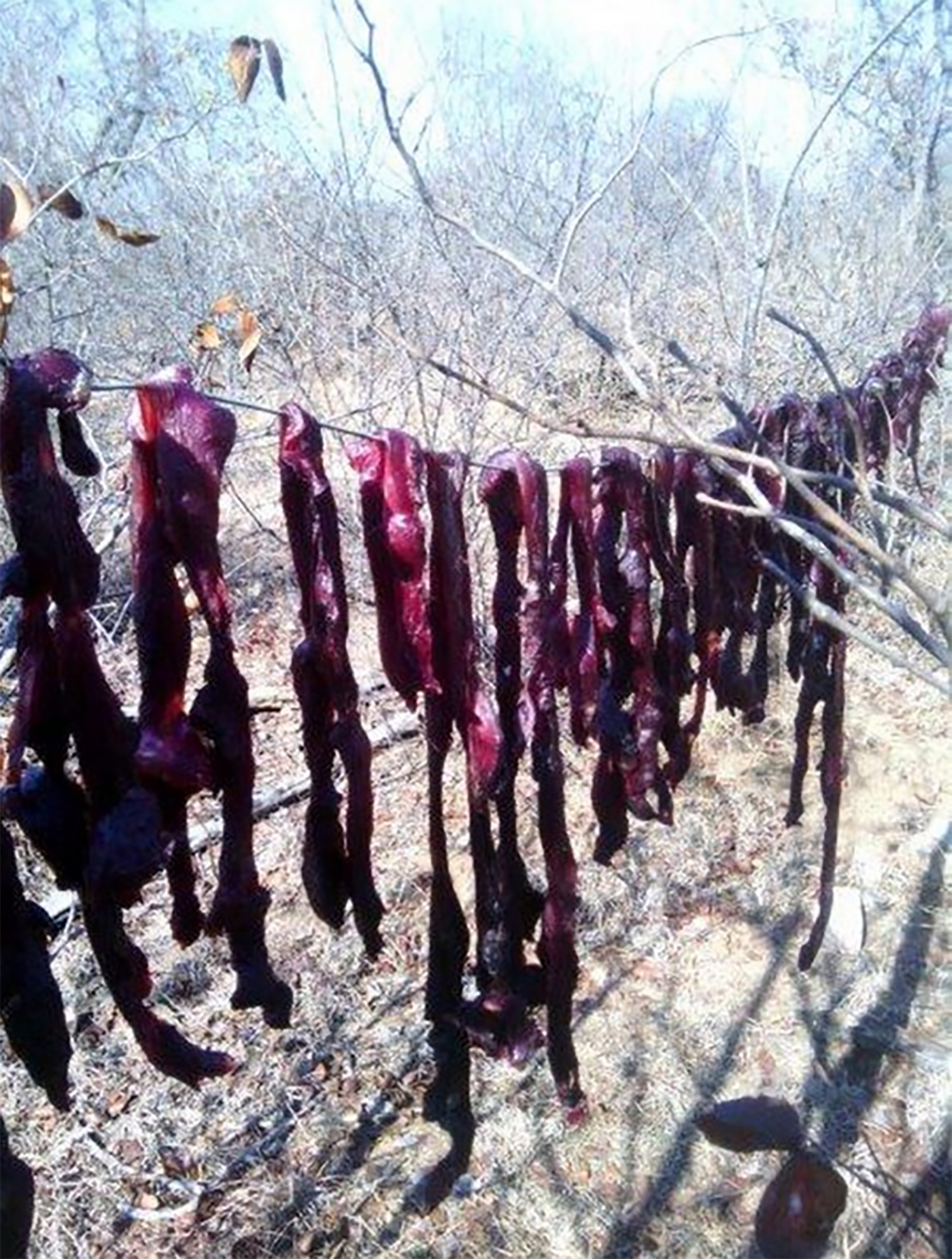
Not that long ago, the Black Mambas would often encounter bush camps in their deployment areas. Here, poachers would dry the meat to easily remove it. (Photo: Transfrontier Africa NPC)
Night patrol
The Mambas’ compound in the Grietjie reserve is a basic brick building with steel doors. It’s spacious but spartan: not much furniture, only beds, wooden wardrobes, stoves and fridges.
I joined Mzimba and another Mamba, Senior Ranger Loveness Mongwe, for a night patrol. It’s a necessary routine in the Big Five area, checking for any fresh breaks in the fence — a tell-tale sign that poachers are at work. A beaten-up Land Rover, Shaya, waits for us under a shed. The three of us squeeze into its single cab. Mzimba turns the key. Shaya chugs into life.
A fresh night breeze blows through the window. Rain is in the air. Could we expect a storm that night? And will we come across lions, I wonder.
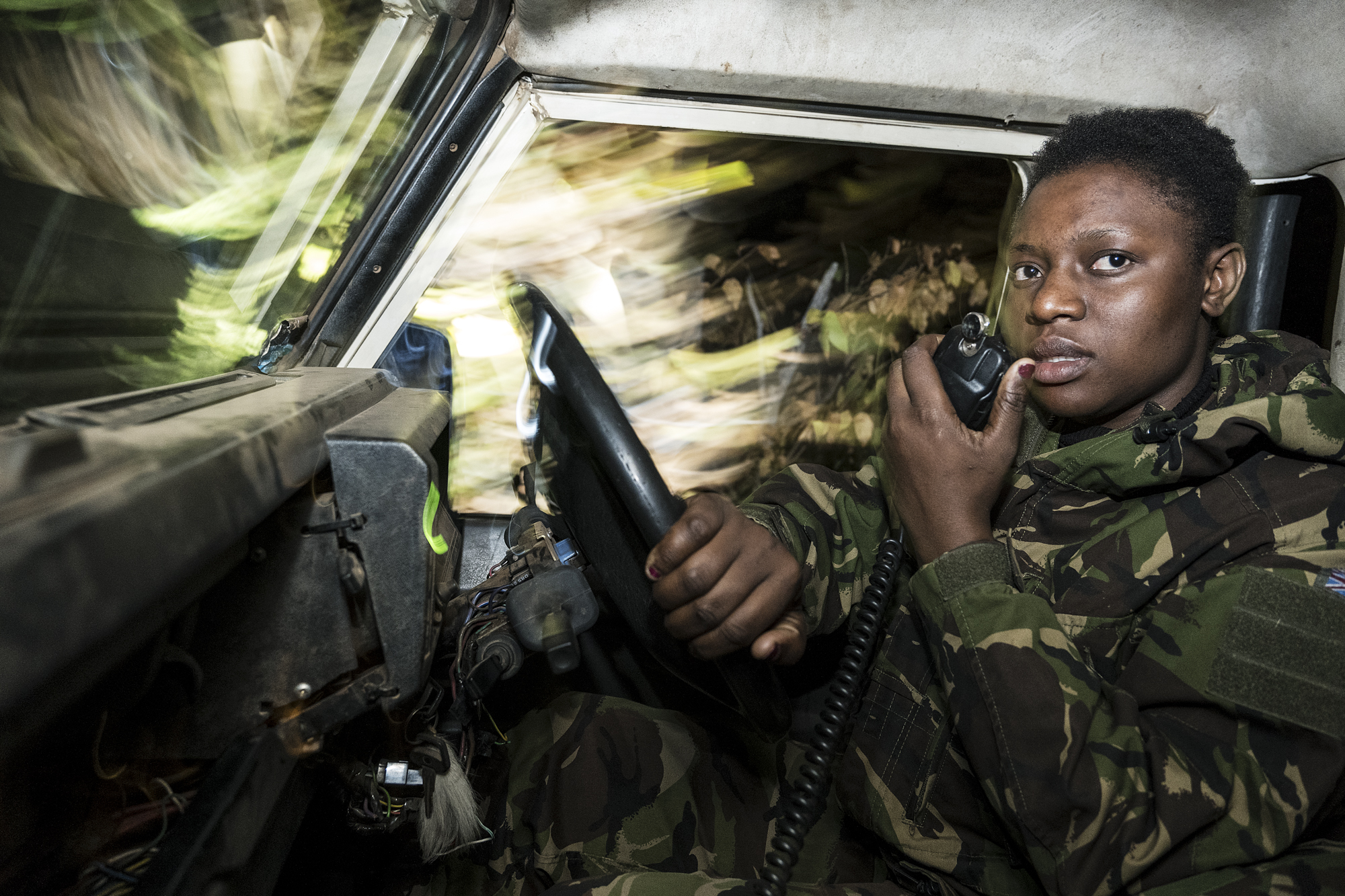
Tired after a long night patrol, navigating rocky terrain in tough conditions, Nkateko Letti (31) provides feedback on the night’s findings to Black Mamba APU’s headquarters. (Photo: Ilan Godfrey / Getty Images for Lumix)
Lions
As a child, growing up on the boundary of Kruger, Mzimba was familiar with the deep sounds of lions roaring in the night. She had nightmares about encountering one, convinced that anyone who did would be eaten alive.
Six months of training with the Mambas changed all that. Over the course of seven years, Mzimba has become accustomed to encounters with dangerous animals in the Big Five reserve.
At Shaya’s helm, she shows no sign of fear. But you have to be alert, says Mzimba. You never know what close encounters you might have, especially on a night as dark as this.
I turn on my voice recorder. The dirt track is bumpy. Shaya rattles and sways along. I hold on to the seat with one hand, my phone in the other, all the while trying to keep open my notebook with all my questions.
“When I applied to be a Black Mamba, my family were not happy. They also thought I could be eaten by a lion or trampled by an elephant,” Mzimba laughs.
Or killed by poachers. Over the last decade, at least 472 rangers have died on active duty in Africa, many of them in the Greater Kruger area, according to the Game Rangers Association of Africa.
Relationships
Despite this, the Black Mambas do their anti-poaching work unarmed. It’s part of a move to create a new conservation ethos — one closely allied to building constructive relationships between rangers and people living near private game reserves in the Greater Kruger area, says Mzimba.
“In my community, a lot of people know I work as a ranger and support me. And my family are now proud. They understand the need for the work we do, and how we also give back to the community,” she says.
The Black Mambas run the Bush Babies Environmental Education Programme, which educates young children about the environment, wildlife, poaching and natural heritage.
“We work with the kids’ parents and elderly community members,” says Mzimba, talking of the need to bridge gaps, not only between protected areas and their neighbours but also the knowledge gaps between the different generations.
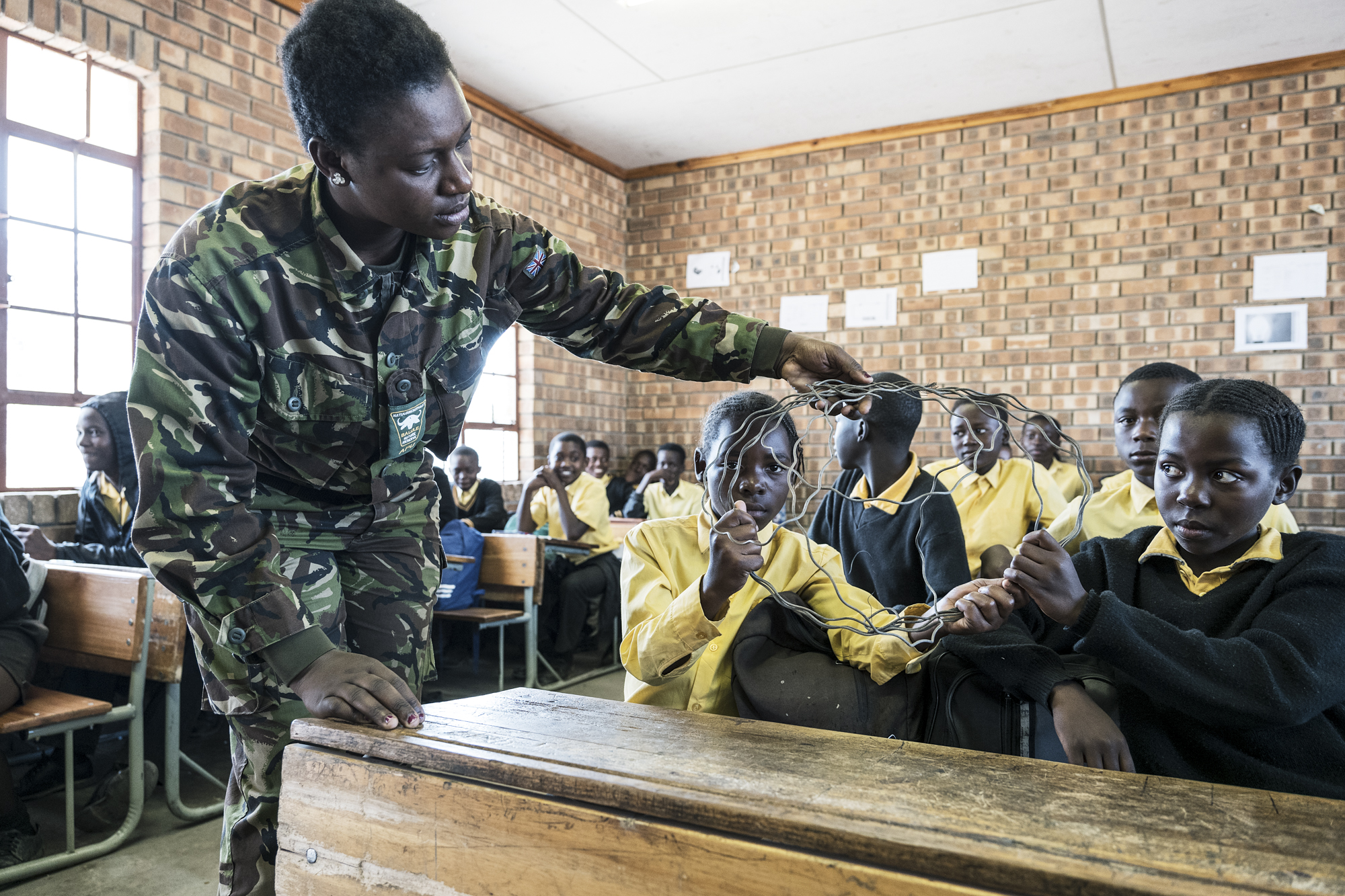
Nkateko Mzimba shows pupils Tyizo Malongane (11) and Mmamolle Shai (11) how a snare entraps vulnerable wildlife species. (Photo: Ilan Godfrey / Getty Images for Lumix)
Mzimba has also started a charity initiative — a feeding scheme of sorts — sparked by Covid-19.
“Ever since the pandemic started, I thought a lot about what I could do to help people,” she says. “I have a job. They do not. So I started to help some poorer families in my village with food.”
And when not on active duty in the game reserve, she and all the other Mambas spent time in classrooms in the villages of Maseke, Makushane and Mashishimale.
“I love working with kids,” says Mzimba. Together with Rosemary Alles, the founder of Global March for Elephants and Rhinos, Mzimba takes children to the Manyeleti Game Reserve, situated between the Timbavati and Sabi Sands game reserves
“It’s important that children develop the love and appreciation of wildlife from a very early age,” says Mzimba.
Jumbo call
“Elephants!” she suddenly exclaims, interrupting the thread of our conversation. She cuts the engine. Soon the night is still but for the sound of the giant pachyderms breaking branches to feed.
After a while, Mzimba fires up Shaya. The elephants, now accustomed to our presence, do not budge. We reverse on to another track. Soon, another elephant looms out of the darkness. It must be a whole herd feeding, says Mzimba, reporting the herd’s presence to the ops room.
We manage to slip past the herd and drive farther along the game fence. Mongwe keeps the spotlights on the fence to check for breaks. Another five hours of work lie ahead. Our conversation deepens. Soon we are discussing what turns people into poachers.

When she’s not on 21-day snaring patrols, Black Mamba ranger Nkateko Mzimba spends time in classrooms at villages near the Kruger National Park. (Photo: Ilan Godfrey / Getty Images for Lumix)
Realities
Mzimba tells me that before joining the Mambas she was naive, unaware that poachers lived in her own community.
These days she knows that a bushmeat poacher she confronts in a reserve could turn out to be someone from a neighbouring family. It is not something she likes to dwell on.
But she sees a big difference between rhino poachers, who are connected to crime syndicates, and those who snare wildlife to get game meat.
And she tells me she often thinks about Chico Khoza’s case, especially the day of his arrest.
“He really was desperately worried about what was going to happen to his wife and four-month-old baby,” says Mzimba.
We drive back to the compound in silence.
The case
Mzimba was never called to testify against Khoza.
Khoza first appeared in the Phalaborwa Magistrates Court on 6 September 2021, four days after his arrest.
Phalaborwa is a name of tribal origin. It means “better than the south” — a name derived from the time Sotho tribes first settled here, when the area was healthier than the fever-ridden areas to the south. It’s a mineral-rich area, and its original inhabitants mined and smelted copper and iron ore as far back as AD 400.
Large-scale commercial copper mining got under way in the 1960s, ultimately resulting in a massive open pit, spanning nearly 2,000m across — Africa’s widest manmade hole, visible from space. But these days, tourism and wildlife play a far bigger role in the life of the town than mining.
The town stretches 3.7km from north to south and 2.5km from east to west. It is almost entirely surrounded by private game reserves, nature conservancies and the Kruger National Park, a gate to which lies about 500m west of the town’s Hendrik van Eck Airport.
The Mozambican border is a two-hour drive away.
Legal Aid
A Legal Aid attorney was appointed to represent Khoza. At his second court appearance, he was granted bail. When Khoza next appeared in court, on 21 September, he pleaded guilty to trespassing and being an illegal immigrant. The court heard that he had left Mozambique in 2003, but still did not have legal resident status or a work permit.
Khoza was fined R1,000 (or four months’ imprisonment), wholly suspended conditionally for five years, said Mashudu Malabi-Dzhangi, the spokesperson for the National Prosecuting Authority in Limpopo.
He was never charged for illegal possession of game meat, and the court never got to hear his crime scene confession.
Denial
Malabi-Dzhangi said the admission made by Khoza to Mzimba would not stand up in court.
“The attorney representing Khoza [said he] denied knowledge of the two bags,” said Malabi-Dzhangi.
Furthermore, there were other footprints at the crime scene.
“After the accused was apprehended, the search continued because of the footprints, meaning the suspect was not the only person who had entered the farm,” said Malabi-Dzhangi.
On the outcome of the Khoza case, Mzimba says: “There is nothing we can do. It was not the police that had caught him, it was us rangers. The code of conduct says we can arrest the suspects, but after the arrest we hand the case in to the police and it is up to the police and the court to make a decision on the charges. We, rangers, keep doing our job.”
Giving back
The small crèche where Mzimba offers her services free of charge has a playground, two classrooms and an ablution block.
“I attended this crèche when I was small. Back then it was very basic — no playground, no furniture, no garden. The crèche did not even have water,” says Mzimba, pointing to a vegetable bed with spinach, onions and tomatoes. “Last year I helped create this garden so kids can learn how to grow their own food.”
Mzimba helps pay the crèche’s electricity bills. She also chips in, buying stationery and wall paint to brighten up the place.
“It is tough, though,” says Mzimba. “Sometimes it takes me two to three months to save up money to make these contributions.”
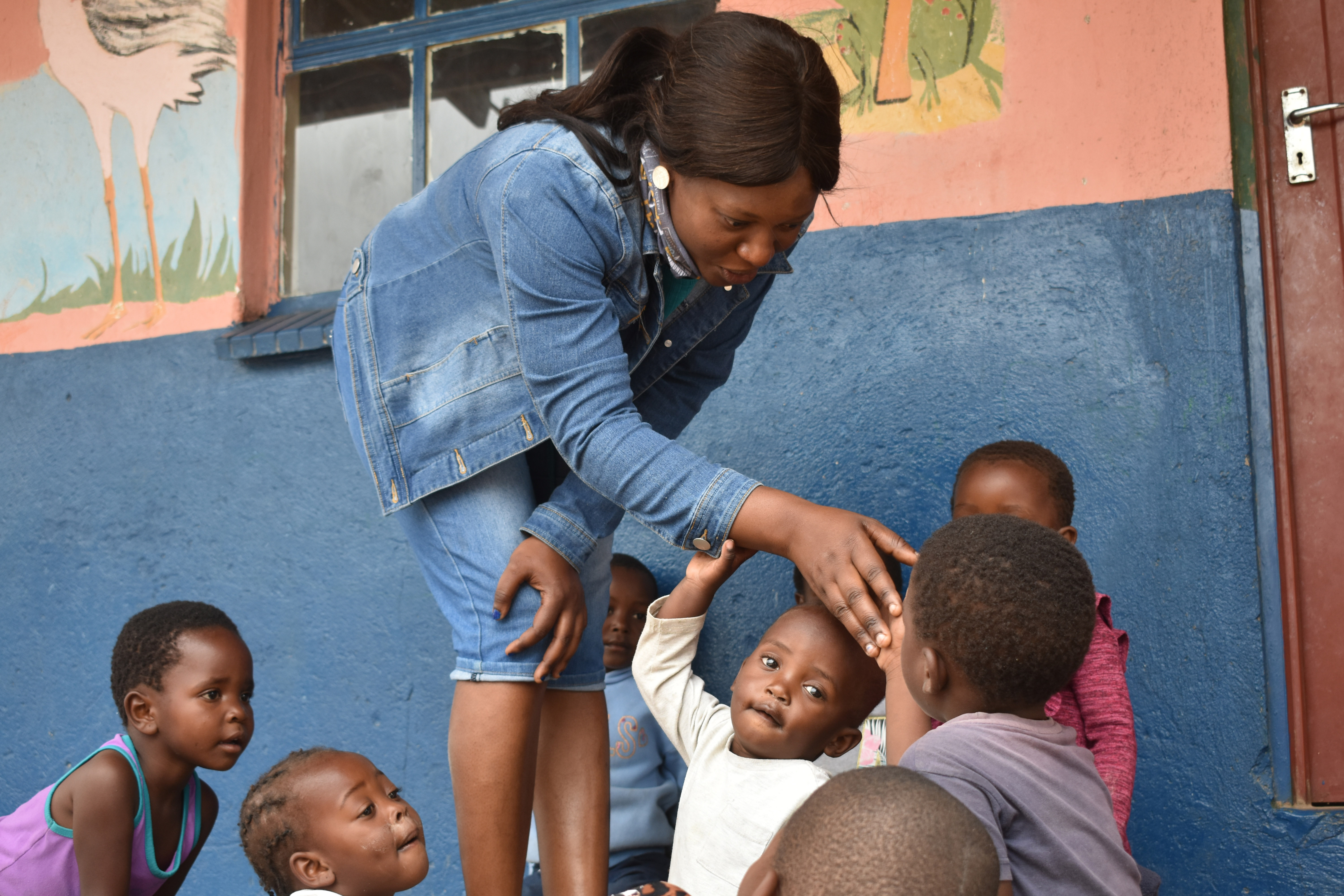
Nkateko Mzimba engages with children at the local crèche. Photo: Valeria van der Westhuizen.
Two women come out. They are crèche managers Phillis Mathebula and Constance Ndlovu. They lead us into the first classroom. Colourful children’s drawings and educational posters — charts with numbers, seasons and days of the week — adorn the pale yellow walls.
T-shirts
“Nkateko has been very good to us,” says Mathebula. “She even bought T-shirts for the kids.”
“And she helps us teach them about nature and why animals are so important,” adds Ndlovu.
“Yes, it’s part of my mission as a ranger,” responds Mzimba, who recently completed an EcoTraining course accredited by the Field Guides Association of South Africa.
“It deepened my knowledge of wildlife behaviour,” says Mzimba.
We walk into the second class with little tables and tiny chairs neatly set out in rows. Mathebula takes toys out of a cupboard. “Just look how old some of these are,” she sighs. “It would be lovely to get new ones.”
A pile of mattresses is stacked near a classroom window. The children sleep here after lunch while waiting for their parents to fetch them.
Safety
It’s a hot day. Mzimba leads us to a shady spot outside, where we continue to chat. A light breeze caresses our faces.
“You know, some of the children face abuse at home,” says Ndlovu. “At least they find safety here.”
A woman with a baby tied around her waist approaches us, a huge smile on her face.
“Meet Michelle,” says Mzimba.
She greets us warmly and starts chatting. I learn that Michelle works at the crèche as a cook, and cares for five children at home.
The small wage she earns helps a lot.
“My elder kids have been to Kruger,” she adds. “They love seeing wild animals.”
Then she looks me in the eye, and says: “If I could, I would also become a ranger.” DM/OBP
Additional reporting, Fred Kockott, Roving Reporters
Valeria van der Westhuizen is the media liaison officer at Transfrontier Africa NPC. This story arises from the Khetha Journalism Project. Supported by USAID, the joint WWF-SA, WESSA and Roving Reporters initiative assists journalists and wildlife advocates report on the broader context of the illegal wildlife trade in Greater Limpopo Transfrontier Park.
[hearken id=”daily-maverick/9419″]











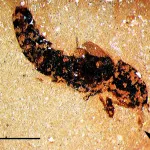








 Become an Insider
Become an Insider
Encouraging article. Thank you.